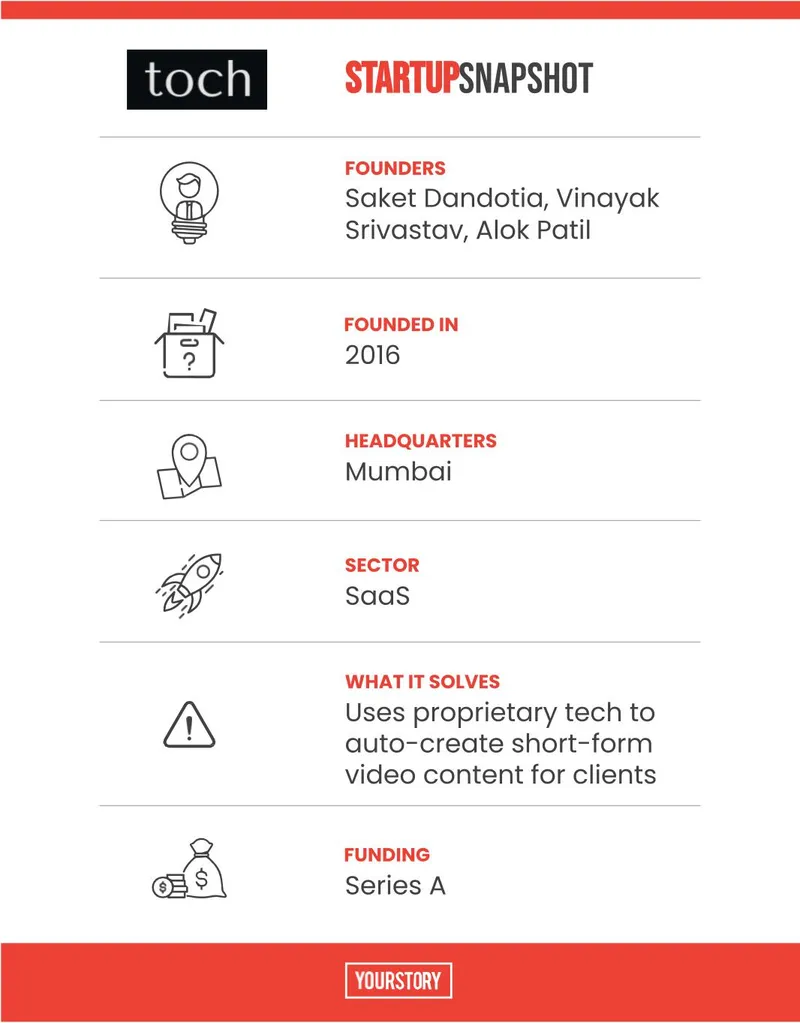[Tech50] This startup is using AI to auto-create short-form videos for OTTs, broadcasters and media platforms
YourStory's Tech50 2021 startup Toch.ai has built a SaaS tool that leverages AI and ML to splice videos to generate short clips of highlights of sports events or key moments of TV shows.
Attention spans are getting shorter by the day and short-format videos have become the norm, especially when it comes to social media. Short-form video content serves both viewers and producers, so it’s a sort of a ‘win-win’ scenario. So, in an age of content glut, it has become almost imperative for brands, platforms, businesses and producers to explore these instant or short-form video formats to keep their users engaged.
The key to cracking this model is a quick turnaround of these video clippings for businesses to be able to monetise. Mumbai-based , which is among YourStory's Tech50 list of most promising early stage startups, has got this covered with the help of Artificial Intelligence (AI) and Machine Learning (ML).
Founded by Saket Dandotia, Vinayak Shrivastav and Alok Patil, Toch.ai has developed an AI-driven technology platform that automates the entire process of how video content is made and delivered in an engaging manner, saving time and money for businesses.
The Software-as-a-Service (SaaS) platform uses technologies such as face and image recognition, vision models, optical character recognition, projection denoising, and audio detection, to analyse a single feed data and produces fresh short-form video content, which is personalised with brand logos, sponsor messages, bumpers, graphics, etc. The content is then auto-shared across 30+ social media platforms.
The five-year-old startup works with the media industry, including news, sports, and entertainment sectors, and is exploring newer segments such as security, road safety, healthcare, and education.

Ideation
Around 2015, long-time friends Alok and Saket had already started exploring AI-led models when they met Vinayak, a venture capitalist and startup consultant, at an industry party. Over a few beers, the three exchanged ideas around the mighty rise of video content and the need to address the video trajectory in respect to real-time with AI technology, and hit it off. They realised they had been thinking about the same solution from different ends and bringing their synergies together was the next obvious move.
“Video editing as a market was completely manual back then. We wanted to bring automation so that media companies can benefit from it. The logic of introducing a metadata tool was to automate identification of unwanted things in the videos like smoking or nudity. The tool removes all this automatically instead of someone having to sit through the entire feed and do it manually,” explains Vinayak.
With the incorporation of Toch.ai in 2016, the trio set out to make a metadata tool for content extraction, but soon realised that the industry was yet to develop in India.
“At that particular time, Amazon Web Services (AWS) and Microsoft were also building something very deep in the space. It was just the right time when cloud services were entering the industry. So we realised that we will miss out on the opportunity even before we establish ourselves,” says Vinayak.
During this time, the founders started gathering interest around the editing space and decided to build their product around it. Following a pivot, they launched their first product in 2018 for live cricket matches.
“It was a very simple tool, but only for live programs or videos, that allowed people to edit content automatically. We were very concentrated on live events as it was much easier for us to watch a cricket match, identify a metadata and clip the most interesting moment,” he says.
The Business-to-Business (B2B) startup managed to make its first revenue within 12 months of the launch. In 2019-20, the pandemic pushed up the adoption and consumption of short-form video content, helping the startup expand beyond cricket and enter other sports events.
“The actual growth journey began from there. We expanded into foreign markets, tweaked our business model and made it a SaaS play. Today, we are focussing on making it a crowd-based solution and bringing in automation to remove the whole manual intervention to create short-form content.”
Time is money
The platform uses AI technology to process video content including live sporting events, television shows, or library-based content, automatically and instantly. The algorithm automatically meta-tags images, video and text, understands the context and identifies key moments that can be auto-created in real-time. This reduces manual editing time by 90 percent, increasing volume of content up to 15X, and subsequently allows better engagement and monetisation for businesses, explains Vinayak. Businesses can then share customised digital video content using existing feeds.
“The whole idea is to allow businesses to gain a faster turnaround time in the creation of engaging tailored video content that is specific to a particular geography or customer profile. Platforms have realised that short videos are something that is getting the maximum amount of viewership and hence need real-time tools tools for quick delivery.”

Business and revenue model
The SaaS platform offers different subscription options for its clients. Its business model includes Application Programming Interface (API) integration and easy-to-use dashboard services.
The startup’s clients whom it doesn’t want to name, include broadcasters, OTT majors, media platforms and creators. Toch.ai claims to have saved 1.2+ billion hours of video processing time, increased viewer time on video by 72 percent, and increased viewer engagement rates by 8.3x for its clients.
In October 2021, the startup raised $11.75 million Series A funding by Moneta Ventures, Baring Private Equity India, Binny Bansal, Ventureast, 9 Unicorns, Anthill Ventures, Cathexis Ventures, SOSV, Artesian and Innoven Capital (backed by Temasek and United overseas bank).
Content for all
The biggest player in the editing space is Adobe, which has already captured $8 billion out of the total $40 billion market, as per their last quarterly report. According to a Grand View Research Inc report, the market for short-form video content is expected to be at $169.4 billion by 2025, and $223.98 billion by 2028 with an anticipated compound annual growth rate (CAGR) of 21 percent from 2021 to 2028.
India alone will be home to 650 million users who consume short-form videos by 2015, a report by Bain & Company suggests.
Given the mammoth amount of content generation in recent years, the need for video-editing softwares and tools is only expected to fly up. Recently, Microsoft acquired video-editing software startup Clipchamp, which validates the demand for such tools.
“It is not one player that takes it all market. There is going to be enough room for every company to try different sets of features. The challenge is to understand the content variation and build a sophisticated tool that serves the end-to-end purpose of all sorts of segments and customers. Moving forward, easy-to-use tools will be most in demand.”
The startup faces competition from global names such as WSC and Grabyo and in the future it aims to go "head-to-head" with products like Adobe Pro.
Going beyond media
The startup is looking to expand its horizons beyond the media and sports segments to enter other areas such as public safety, health, and education. It plans to launch new products/tools in the first quarter of 2022, says Vinayak, who wishes to take the company public eventually.
Toch.ai’s USP (unique selling point) is that a single feed of data is used to develop automated video solutions, reducing time and lowering costs for businesses. The fact that it is delivered through a SaaS model is likely to increase the adoption of its technology platform. However, the challenge will always be regarding the quality of data it receives and understanding customer demand, which according to the founders is the priority. The startup doesn't want to divulge its revenue numbers but assures that it has been doing well, especially over the last six months.
Edited by Ramarko Sengupta


![[Tech50] This startup is using AI to auto-create short-form videos for OTTs, broadcasters and media platforms](https://images.yourstory.com/cs/2/628912e0d7f211eb8e8307e5b6451cf7/tochfoundersfinal-1639315665208.jpg?mode=crop&crop=faces&ar=2%3A1&format=auto&w=1920&q=75)






